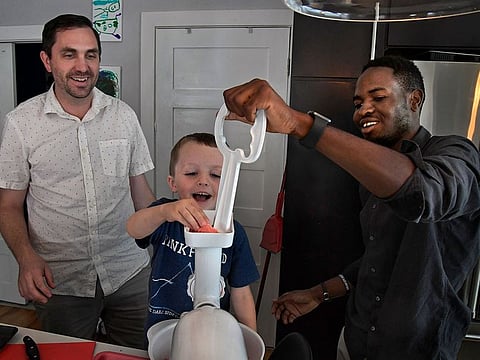‘I had finally someone to call dad’
Teen refugee from Democratic Republic of Congo recalls fond family celebrations

Also In This Package
Washington: The meat grinder whirred to life as Dieudonne Kazzembe fed chunks of raw beef into the metal pan on top of the machine. On his father’s instruction, the 18-year-old increased the speed on the grinder, causing cylinder-shaped meat to ooze into the bowl on the kitchen counter.
“There we go,” Joe McGill said, grinning, as his four-year-old son, Jack, puttered over to join the fun. “We got ground meat.”
McGill’s father, ‘Papaw’ was slouched on the sofa cradling 20-month-old Gavin, while the boys’ mother, Allison McGill, snapped photos from across the living room.
Joe McGill’s Father’s Day was complete. And so was Kazzembe’s.
Until last year, the teenager had never celebrated the occasion.
Grandfather slaughtered
Born in the Democratic Republic of Congo, Kazzembe has almost no recollection of his biological parents, who died before he was three. He spent his early years with his grandparents in the eastern city of Goma. Just after his fifth birthday, rebel forces stormed their home and Kazzembe watched as his grandfather was killed.
He moved to a refugee camp in Uganda with what was left of his family and stayed there for eight years. In 2014, in what he still describes as “a miracle”, Kazzembe was allowed to come to the United States as an unaccompanied refugee minor. He arrived in the District and lived in three foster homes before being placed with the McGill family in February 2018 by Lutheran Social Services of the National Capital Area.
“It wasn’t like my other foster homes, because this was a complete family. A mum, dad, kids. I hadn’t been in a family like that ever before,” Kazzembe said as he helped prepare for a family cookout, days ahead of World Refugee Day, on Thursday.
Fuelling a fresh debate
A record 71 million people have been displaced worldwide by war, persecution and other violence, the UN refugee agency said Wednesday, an increase of more than 2 million from a year earlier — and an overall total that would amount to the world’s 20th most populous country.
The annual ‘Global Trends’ report released by the UN High Commissioner for Refugees counts the number of the world’s refugees, asylum seekers and internally displaced people at the end of 2018.
The figures, coming on the eve of World Refugee Day, are bound to add fuel to a debate at the intersection of international law, human rights and domestic politics, especially the movement in some countries, including the United States, against immigrants and refugees.
Launching the report, the high commissioner, Filippo Grandi, had a message for US President Donald Trump and other world leaders, calling it “damaging” to depict migrants and refugees as threats to jobs and security in host countries. Often, they are fleeing insecurity and danger themselves, he said.
The report also puts a statistical skeleton onto often-poignant individual stories of people struggling to survive by crossing rivers, deserts, seas, fences and other barriers, natural and man-made, to escape government oppression, gang killings, sexual abuse, militia murders and other such violence at home.
Finding a family match
Back in Washington DC, the Lutheran Social Services of the National Capital Area has placed about 100 unaccompanied refugee minors in foster homes since the 1980s.
“It was the summer of 2016 when we decided we wanted to really do this, to foster a child,” said Joe McGill, an analyst with the Transportation Security Administration. “Jack had just turned 2 and one of his favourite words was ‘home’. He kept saying ‘home’, ‘home’, and I felt like it was haunting me because I kept thinking of these kids we were seeing in the news without a home.”
After undergoing a 10-week training programme, the McGills were matched with a girl who was slated to arrive from Egypt, but they were soon notified that she would be unable to come because of the Trump administration’s tightening immigration restrictions. This scenario repeated several times until Lutheran Social Services eventually told the McGills that they had a client who was already in the Washington region. Within weeks, Kazzembe arrived at their home on Capitol Hill.
“Oh boy, do I remember that day,” Allison McGill said.
‘I had never seen a family like this before’
Gavin was crying, Jack had just come out of the bathroom, and Porter, the family’s 120-pound mixed-breed dog, decided to welcome Kazzembe by pouncing on him, she remembered. The McGills were worried that he would be overwhelmed, but the soft-spoken teenager had a different impression.
“I had never seen a family like this before. It was just like happiness was floating inside the house,” he said.
In the year since joining the McGills, Kazzembe has thrived. On Saturday, he graduated salutatorian of his class at Cardozo Education Campus, and in August, he will attend Arizona State University on a full scholarship.
“He’s turned into a terrific young man,” McGill said, resting in front of a barbecue grill in the backyard. He rattled off a list of his son’s achievements, then added energetically, “Oh and what a natural driver. You should have seen the first time he parallel parked.”
A week after Kazzembe moved in, McGill received a text from him that read: ‘goodnight dad’. It was the first time Kazzembe had referred to him as ‘dad’. McGill said he will always remember that text — as will Kazzembe. “It was the first time I had someone to call ‘dad’,” he said.
— With inputs from agencies




